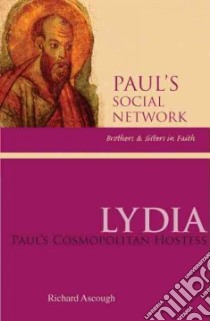Lydia - 9780814652695
Un libro in lingua di Ascough Richard S. Malina Bruce J. (EDT) edito da Michael Glazier, 2009
- € 13.50
- Il prezzo è variabile in funzione del cambio della valuta d’origine
Human beings are embedded in a set of social relations. A social network is one way of conceiving that set of relations in terms of a number of persons connected to one another by varying degrees of relatedness. In the early Jesus-group documents featuring Paul and coworkers, it takes little effort to envision the apostle's collection of friends and friends of friends that is the Pauline network. The persons who constituted that network are the focus of this set of brief books. For Christians of the Western tradition, these persons are significant ancestors in faith. While each of them is worth knowing by themselves, it is largely because of their standing within that web of social relations woven about and around Paul that they are of lasting interest. Through this series we hope to come to know those persons in ways befitting their first-century Mediterranean culture.
Women played a prominent role in the development of the early Jesus communities and formed an essential part of Paul's social network. Lydia was one such woman. Her heart was opened to Paul's message, she responded with faith by being baptized, and she offered her home in hospitality to Paul and his companions. But beyond this not much is known of her. InLydia: Paul's Cosmopolitan Hostess, Richard S.Ascough constructs an image of Lydia based on what is known about the political, commercial, social, and religious norms of the first-century world. Ascough describes the styles of possible dwellings in which Lydia could have lived, the business opportunities that would have been available to her, and the religious cults that held sway in Philippi at the time. With Ascough, readers will find that the importance of Lydia's story is that she hears the message of God through Paul and responds with faith.
Richard S. Ascough is associate professor of New Testament at Queen's Theological College, Kingston, Ontario. He is the author of numerous articles and essays on the documents and contexts of the early Jesus believers, particularly their community structures. His books include: Passionate Visionary: Leadership Lessons from the ApostlePaul (with Sandy Cotton, Novalis/Hendrickson, 2005),What Are They Saying About the Formation of Pauline Churches? (Paulist Press, 1998), andPaul's Macedonian Associations (Mohr Siebeck, 2003).
Informazioni bibliografiche
- Titolo del Libro in lingua: Lydia
- Sottotitolo: Paul's Cosmopolitan Hostess
- Lingua: English
- Autori : Ascough Richard S. Malina Bruce J. (EDT)
- Editore: Michael Glazier
- Collana: Michael Glazier (Paperback)
- Data di Pubblicazione: 15 Febbraio '09
- Genere: RELIGION
- Argomento: Women in the Bible
- Pagine: 127
- Dimensioni mm: 209 x 139 x 6
- ISBN-10: 0814652697
- EAN-13: 9780814652695


